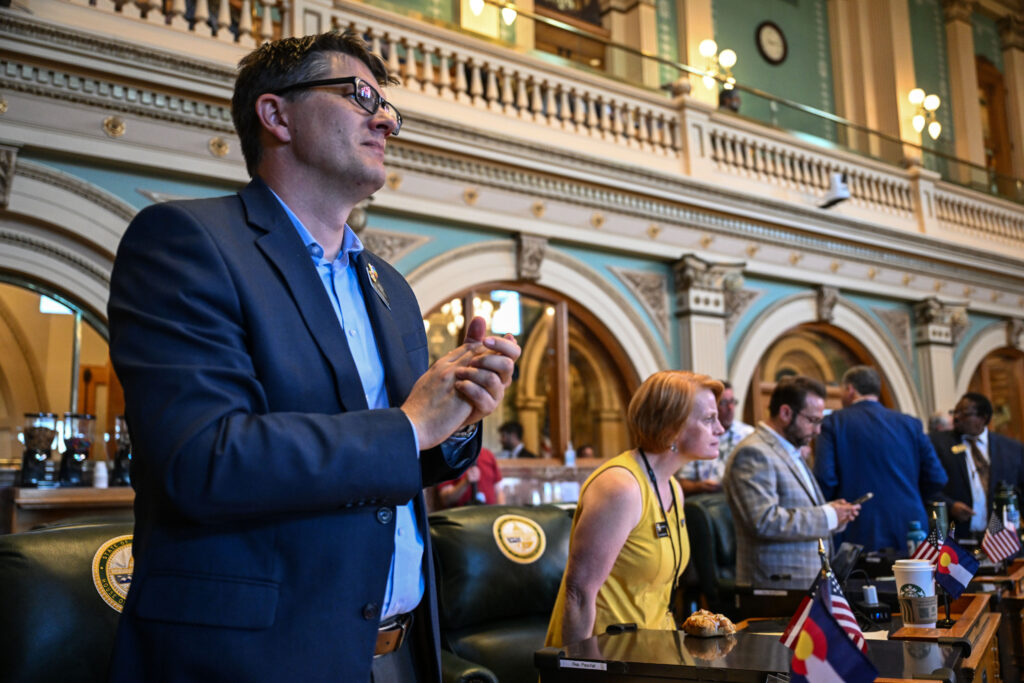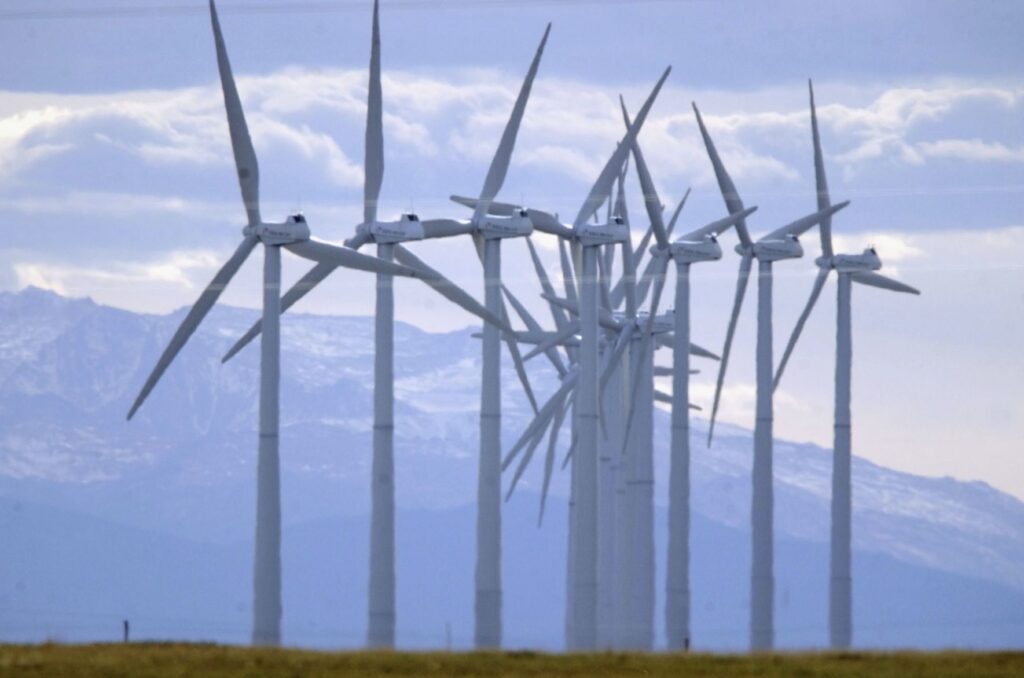Colorado building owners face $17 million per year fine under energy bill
A measure aimed at easing some of the near-term requirements from a 2021 law that seeks to reduce greenhouse emissions is facing opposition from the industry it claims to be assisting, with businesses noting the bill allows for tens of millions of dollars in fines.
House Bill 1269, sponsored by Reps. Jenny Willford, D-Northglenn, and Alex Valdez, D-Denver, seeks to ease some of the requirements outlined in a 2021 law, which established the building performance program in the Colorado Energy Office. Under that bill, buildings over 50,000 square feet, which amounts to about 8,300 buildings statewide, are required to achieve a 7% reduction in greenhouse gas emissions by 2026.
After hearing from building owners who argued that the standards would be difficult to implement by 2026, lawmakers are considering designate the deadline as a “goal,” rather than as a requirement.
Notably, House Bill 1269 requires buildings to reduce emissions by 13% compared to 2019 benchmarks, rather than a 7% reduction from 2021 levels.
To businesses, that distinction is crucial — office settings radically changed during the COVID-19 pandemic. Looking back to 2019 means capturing a “more realistic” scenario, business advocates said.
Under Democratic control of the state Capitol, Colorado is seeking to quickly transition away from fossil-fired energy. Supporters argued the transition — while acknowledging it might be painful in the short term — positions Colorado for a more sustainable and energy-efficient future. They said it would help wean the country from dependence on foreign oil. Ultimately, they added, the transition toward green energy is good for the environment and people’s health.
Critics maintained the quick transition is failing to protect American consumers, particularly low-income residents, who already contend with soaring inflation, and that the singular focus on alternative energy is short-sighted, given that America is rich in all forms of energy and that nuclear power can provide the state with a viable, sustainable and “green” baseline. Critics also said the goals are unrealistic and forcing businesses to comply would be costly and counterproductive.
A fine of $47,000 per day
While building owners and real estate developers applauded the bill’s provisions to relax the deadlines they view as unachievable, they are worried about the bill’s creation of the Building Decarbonization Enterprise, which would provide technical and financial assistance to building owners to help them implement the changes necessary to meet the state’s decarbonization requirements.
The new enterprise would cost building owners a $400 annual fee.
Willford said racing to comply with the standards set by House Bill 1286 is putting a lot of pressure on building owners. It has come to lawmakers’ attention, the Democrat said, that “additional funding and support” is necessary to ensure the state meets its climate goals.
Stephen Shepard, executive director of the Colorado Building Owners and Managers Association, argued that imposing one-size-fits-all mandates and regulations doesn’t work in an industry like his.
“We have come to the table hoping to have the voice of the industry most affected by these programs heard now and moving forward, and that has not always been true in the past,” he said, adding his group’s members have worked to reduce their buildings’ energy usage long before the state implemented its standards.
According to Bia Campbell of Colorado Concern, the 2021 bill carried a maximum penalty of $5,000 per month, which could translate to $60,000 a year.
House Bill 1269 removes that cap and reverts the fee to to $47,357 per day for violations.
Under the bill, a building owner could potentially face up to $17 million in an annual fine.
Apartment advocate: Bill could mean rent increases for low-income Coloradans
Andrew Hamrick of the Colorado Apartment Association said affected residential building owners would likely increase their rent to compensate for the proposed fees in the bill.
Multifamily housing, which advocates describe as the most energy-efficient form of housing in the state, tends to serve more low-income people than single-family housing, Hamrick said, meaning this bill would result in rent increases for the people least able to afford them.
“You are setting up a system where rich people in single-family homes will enjoy the benefit of inexpensive natural gas, while poor people in apartments pay three times as much for energy to satisfy our carbon reduction standards,” he said.
While the apartment association supports the bill’s provisions to relax compliance standards, the group strongly opposes the increase in fines, which could quickly pile up and cost a business more than $17 million a year.
David Spriggs, a businessman, said he has paid consultants thousands of dollars over the past few years to help him ensure his property complies with the state’s energy requirements.
He’s been told the upgrades would cost him up to $1 million, and even then, he isn’t 100% sure they’ll be entirely up to code.
“I don’t have a fund. I don’t have anybody back on Wall Street. This is money that comes directly out of my pocket,” Spriggs said.
He encouraged bill sponsors to meet with building owners and develop a process that, he said, would reduce regulation and incentivize compliance, rather than punishing violations.
“The state of Colorado spends hundreds of millions of dollars to bring big companies to Colorado to create jobs while at the same time creating regulations, fines, and disincentives for small business owners that are already here,” Spriggs said.
Advocates: Standards are necessary to achieve decarbonization goals
Nicholas Rames of the American Institute of Architects said he has been involved in meetings over the bill since before it was introduced.
Colorado is navigating relatively uncharted territory in imposing minimum energy efficiency standards for buildings — only three other states have done the same — so, it’s unsurprising that there have been some unprecedented challenges along the way, Rames said.
“We applaud this bill as part of the effort to reexamine which parts of the program are working as intended and which need changes to ensure its long-term success,” he said. “The built environment is a significant contributor to greenhouse gas emissions, and if we’re going to meet our emission reduction goals and protect Colorado from the worst impacts of climate change, it’s imperative that our buildings in the state understand their part in this broader effort.”
Paul Sherman of Conservation Colorado said energy-efficient buildings are “paramount” to achieving Colorado’s climate goals.
Having standards in place makes the electrification process easier for building owners because it provides them with different ways to reduce emissions, such as installing energy-efficient appliances, improving insulation and using renewable electricity.
“By cutting carbon emissions from existing buildings, we can improve indoor and outdoor air quality, ensure safe and efficient electric appliances for residents, and lower utility costs for consumers and building owners,” Sherman said.
Sherman said with the federal government rolling on back “clean energy” investments, it is more important than ever for Colorado to build “climate resiliency.”
“The actions Colorado takes now and in the coming years will be crucial to our efforts to combat climate change,” he said.
Concerns about fines are unfounded, sponsors say
Willford said the bill moves the program to the Air Quality Control Commission, whose statute includes maximum fines of roughly $47,000 per day because the commission often handles violations by large industrial operations.
“While the state’s full penalty authority is high, it’s not the state’s practice to assess penalties at the maximum amount for the kinds of violations anticipated with the building efficiency regulations,” Willford said. “Building performance standards are not of the same impact as most serious violations for which the state would assess penalties near the maximum.”
Valdez, meanwhile, assured members of the House Energy and Environment Committee that as, the would-be arbiter in matters regarding violations by building owners, the Energy Office is much more concerned with compliance than penalties.
Valdez said the state is working to provide building owners loans and energy performance contracting through the Energy Office. This program helps businesses finance renewable energy projects with “little or no” upfront investment. The state also receives about $70 million in federal Home Efficiency Rebates for multifamily homes, which sponsors hope will help ease some of the financial burden for residential building owners and tenants.
“I am sure that the Colorado Energy Office is absolutely committed to continuing to explore every opportunity to bring more dollars into Colorado to support buildings in their pursuit of decarbonization,” Willford said.
Republicans balked at the measure, with Rep. Dan Woog of Erie calling it “regulatory overreach.” The committee’s nine Democrats voted in its favor, moving it to the House Finance Committee, where its hearing is scheduled for March 27.
House Bill 1269 is sponsored in the Senate by Sens. Cathy Kipp, D-Fort Collins, and Matt Ball, D-Denver.



